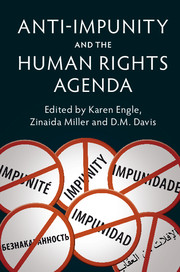Crossref Citations
This Book has been
cited by the following publications. This list is generated based on data provided by Crossref.
2017.
Books Received.
American Journal of International Law,
Vol. 111,
Issue. 2,
p.
572.
Stewart, Luke J.
2018.
Too loud to rise above the silence: the United States vs. the International War Crimes Tribunal, 1966–1967.
The Sixties,
Vol. 11,
Issue. 1,
p.
17.
Carmody, Michelle Frances
2018.
Human Rights, Transitional Justice, and the Reconstruction of Political Order in Latin America.
p.
1.
2018.
Summaries of Doctoral Dissertations.
The Journal of Economic History,
Vol. 78,
Issue. 2,
p.
575.
Baaz, Maria Eriksson
and
Stern, Maria
2018.
Curious erasures: the sexual in wartime sexual violence.
International Feminist Journal of Politics,
Vol. 20,
Issue. 3,
p.
295.
Abel, Richard L.
2018.
Law's Trials.
Sander, Barrie
2019.
The expressive turn of international criminal justice: A field in search of meaning.
Leiden Journal of International Law,
Vol. 32,
Issue. 4,
p.
851.
Neuman, Gerald L.
2020.
Human Rights in a Time of Populism.
p.
250.
Iturralde, Manuel
2020.
Transnational Legal Ordering of Criminal Justice.
p.
234.
Savelsberg, Joachim J.
2020.
Transnational Legal Ordering of Criminal Justice.
p.
205.
Lohne, Kjersti
2020.
Penal humanitarianism beyond the nation state: An analysis of international criminal justice.
Theoretical Criminology,
Vol. 24,
Issue. 2,
p.
145.
Miller, Zinaida
2020.
Stabilising the Contemporary Middle East and North Africa.
p.
281.
De Vos, Christian M.
2020.
Complementarity, Catalysts, Compliance.
2021.
The Work of Rape.
p.
1.
2021.
The Work of Rape.
p.
229.
Lohne, Kjersti
2021.
Penal welfarism ‘gone global’? Comparing international criminal justice to The Culture of Control.
Punishment & Society,
Vol. 23,
Issue. 1,
p.
3.
2021.
The Work of Rape.
p.
174.
2021.
The Work of Rape.
p.
88.
2021.
The Work of Rape.
p.
49.
2021.
The Work of Rape.
p.
142.





